Student-led organization protests the mandated vaccine at USU
On Aug. 23, the Federal Drug Administration officially approved the Pfizer/BioNTech COVID-19 vaccine.
Since then, vaccine mandates have become widespread on many college campuses, including Utah State University.
In a letter released on Aug. 27, to the students and faculty, President Noelle Cockett announced that vaccines would be required for all students by the start of spring semester in order to be able to have in-person classes and activities continue.
So far, seven colleges in Utah have vaccine mandates: the University of Utah, Utah Valley University, Weber State University, Salt Lake Community College, Westminster College, Davis Technical College, and now Utah State University.
But some students are not happy with the requirement.
Tyson Reese, a USU student, is the Utah State Chair of the pro-liberty student-led organization, Young Americans for Liberty, or YAL.
While it started as Students for Ron Paul, the organization now has a long history of supporting campus activism all over the United States.
According to Reese, the organization will “work to hold all government workers accountable and keep the laws and enforcement of the laws within the boundaries of the constitution and the principles of life, liberty and happiness.”
The latest movement undertaken by YAL is a petition against the new vaccine mandate.
“These medical decisions are not one size fits all. This vaccine has shown that,” Reese said. “Whether it’s for practical reasons like following the science and seeing that natural immunity works best, whether it’s conspiratorial, or whether it’s medical or religious complications, it doesn’t matter. This is a human rights violation.”
Reese has been trying to collect signatures, and hopes that 500 signatures — among other measures — will be enough to sway the decision of the university.
Since the start of the campaign on Sep. 14, they have gathered 65 signatures. They also plan on emailing the president and visiting in person.
If their petition is not successful, they will move to the state legislature. Reese stated because USU is a public university, they believe the legislature will support their fight against mandated vaccines.
This however, seems unlikely. Since the Pfizer vaccine has been approved by the FDA, it is considered the same as any other vaccine or immunization, like measles or polio vaccines which are already required for back-to-school shots.
There are also broad exceptions, as stated in the announcement from Cockett. Students can claim exemption from the vaccine for personal, religious or medical reasons.
These exemptions aren’t enough though, according to Reese.
“It’s the principle of one’s right to their own anatomy,” Reese said. “You have a right to make these decisions for yourself and shouldn’t be forced to jump through legal loopholes and give an explanation for why you don’t want to do this.”
Belle Bennet agrees with Reese, “Students should be able to decide for themselves if they want to get vaccinated.”
Since the announcement was released, the members of the USUSA also made a press release which showed their support of the vaccine.
In that statement, USUSA President Lucas Stevens called on students to take individual responsibility to support the health of the community.
“Like most of you,” Stevens said, “we want to see you face-to-face at all of the events and traditions that make the Aggie experience so exceptional. But, we cannot move forward from this pandemic without uniting as a student body — everyone must take individual responsibility and action.”
For more information about the vaccine here at USU, visit vaccine.usu.edu. To contact student leaders, visit involvement.usu.edu. To get involved with the petition or for more information regarding it, email tyson.reese@yaliberty.org.
Maggie.Erekson@usu.edu


This article is a sad example of the cowardly relativism of contemporary journalism, which does not see truth as its end, but lazily juxtaposes the arguments of “both sides” in the name of “balance.” Reese’s falsehoods and plainly specious arguments are presented as though they were not objectively false and specious, but merely one valid opinion among others. The article is entirely in the spirit of the ancient Greek sophists: there is no truth; there are two opposed arguments about everything.